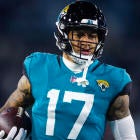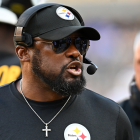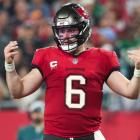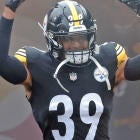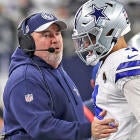 |
| Colts coach Chuck Pagano is not the first coaching leader to require a health-related leave of absence during the season. (AP) |
The Indianapolis Colts announced Monday that coach Chuck Pagano will miss multiple games due to a battle with a treatable form of leukemia. A look at other notable in-season illnesses and ailments that took coaches in the four major pro sports, college football and college basketball out of commission, and the impact of their convalescence on the teams they coached:
Manager: Dusty Baker, Cincinnati Reds
Year of health problem: 2012
Ailment/Games Missed: Baker suffered what was described as a "mini-stroke" on Sept. 19, missing 11 games. Baker is expected to return Monday for the Reds' regular season-ending series against the Cardinals.
Impact: The Reds went 7-4 in Baker's absence, wrapping up the NL Central title with bench coach Chris Speier at the helm.
Coach: Jim Calhoun, Connecticut basketball
Years of health problems: 2002-03, 2009-10, 2011-12.
Ailments/Games missed: Calhoun missed nearly a full season's worth of games during his 26 seasons at UConn, but was only laid up for a significant number of games in 2002-03 (five due to prostate surgery), 2009-10 (seven due to stress) and 2011-12 (eight due to back surgery). He missed a total of 20 games during those three stints.
Impact: The Huskies were 9-11 during Calhoun's three extended absences, still managing to make the NCAA tournament in 2003 and 2012, and settling for the NIT in 2010.
Coach: Steve Lavin, St. John's basketball
Year of health problem: 2011-12
Ailment/Games Missed: Lavin missed all but four games in 2011-12 while recuperating from prostate cancer.
Impact: After making the NCAA tournament in 2010-11, the Lavin-less Red Storm struggled to a 13-19 record with Mike Dunlap filling in for most of the season. Lavin is slated to return in 2012-13, while Dunlap was named head coach of the NBA Charlotte Bobcats this past June.
Manager: Tony La Russa, St. Louis Cardinals
Year of health problem: 2011
Ailment/Games Missed: La Russa missed six games in May 2011 due to a bout with shingles.
Impact: The Cardinals went 2-4 under bench coach Joe Pettini, then won eight of nine immediately following La Russa's return. The team would eventually qualify for the playoffs as the NL wild-card team and win the World Series.
Coach: Mark Dantonio, Michigan State football
Year of health problem: 2010
Ailment/Games Missed: Dantonio suffered a heart attack hours after a thrilling, 34-31 Michigan State win over Notre Dame pushed the Spartans to 3-0 on the season.
Impact: Dantonio missed two games -- wins over Northern Colorado and Wisconsin that were presided over by offensive coordinator Don Treadwell -- before returning (while coaching from the press box) for a win over Michigan. The Spartans would finish 11-2 including a loss to Alabama in the Capital One Bowl.
Coach: George Karl, Denver Nuggets
Year of health problem: 2009-10
Ailment/Games Missed: Karl missed a total of 31 games while undergoing treatment for neck and throat cancer.
Impact: The Nuggets were 40-17 when Karl took a leave of absence following the All-Star break. Though they held on to win the NBA's Northwest Division, a middling 13-12 finish under assistant Adrian Dantley dropped the team from the second seed to the fourth. Once in the playoffs, Denver dropped a first-round series in six games to the Jazz. Karl returned the following season, and Dantley's contract was not renewed.
Coach: Jim Boeheim, Syracuse basketball
Year of health problem: 2001-02
Ailment/Games Missed: Boeheim missed three games after being diagnosed with prostate cancer in December 2001.
Impact: Syracuse went 1-2 under assistant Bernie Fine, including losses to Georgia Tech and N.C. State. The Orange (23-13 on the year) subsequently missed the NCAA tournament, but Boeheim would win his lone title to date with a Carmelo Anthony-led group the following season.
Coach: Rick Majerus, Utah/Saint Louis basketball
Years of health problems: 2000-01, 2012-13
Ailment/Games Missed: Majerus missed all but one game of Utah's 2000-01 season before taking a personal leave of absence to recover from knee surgery, a heart procedure and to tend to his mother who was battling cancer.
Impact: Under interim coach Dick Hunsaker, the Utes finished 19-12 and saw a streak of six consecutive NCAA tournament appearances come to an end. Majerus returned the team to the NCAA tournament the following season. In August, Majerus announced he'd be taking a season-long leave of absence from his coaching duties at Saint Louis due to a heart condition. Billikens assistant Jim Crews will serve as interim coach.
Coach: Roger Neilson, Philadelphia Flyers
Year of health problem: 1999-2000
Ailment/Games Missed: Neilson was diagnosed with bone marrow cancer in February 2000, missing the final 25 games of the regular season and the team's subsequent run through the playoffs.
Impact: After winning the Atlantic Division, the Flyers under interim coach Craig Ramsey lost the Eastern Conference finals in seven games to the Devils. Though Neilson expressed a wish to return during the playoffs, the Flyers would not allow the move and subsequently made Ramsay the permanent coach for 2000-01 (though he was fired 26 games in). Neilson died on June 21, 2003.
Coach: Dan Reeves, Atlanta Falcons
Year of health problem: 1998
Ailment/Games Missed: Reeves missed two games at the end of the 1998 regular season due to heart problems that necessitated quadruple-bypass surgery.
Impact: The Falcons won their final two games with defensive coordinator Rich Brooks guiding the ship, before Reeves returned in January to lead the team to its lone Super Bowl appearance.
Coach: Mike Krzyzewski, Duke basketball
Year of health problem: 1994-95
Ailment/Games Missed: Krzyzewski missed the final 19 games of the 1994-95 season after having back surgery and suffering from exhaustion.
Impact: After a 9-3 start, the Coach K-less Blue Devils nosedived to a 4-15 finish under assistant coach Pete Gaudet. Gaudet left the team after the season. Krzyzewski returned the following year and has since led the program to 17 consecutive NCAA tournament appearancess, including four Final Fours and two NCAA titles.








